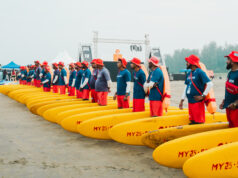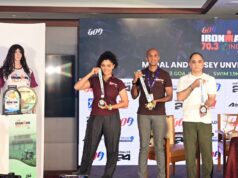Triathlon is a sport that is growing in popularity in Goa. The swim-bike-run routine that stretches the athletes to the core, debuted in Goa over a decade ago but has been making international news since Ironman 70.3 came to the Indian shores in 2019. Former journalist turned Goa-based PR consultant Rahul Chandawarkar has been a triathlete and has recently achieved the distinction of being the only successful participant from Goa in the age-group of 60-65 years at the third edition of Ironman 70.3 India held in Panaji earlier this month.
Livenewsgoa.com caught up with the 60-years-young former newspaper editor Rahul, who has successfully completed his overall seventh triathlon and fourth Ironman 70.3 (113kms).
Q&A
LNG. What made you take on the challenge of Ironman 70.3 at the age of 60?
RC: I have been an active sportsman since age 6 when I joined the sporting, Don Bosco school in Panaji. I learnt my first football lessons in this excellent school.
Later, I developed an interest for running and hockey at my alma mater, the St Vincent’s High School in Pune which is a very fine, sports-oriented school. I later represented my college teams in multiple sports like hockey, athletics and cricket. I also cycled about 20 kms everyday from class 7 right upto my early college life. This was my basic sports foundation. Later, even as a busy newspaper editor in Pune, I always devoted one hour to sport everyday (swim, bike or run). Hence, when my wife and I decided to settle down in a Goan village, 8 years back, I began sea swimming and started Triathlon training in 2016. I took part in my first, Olympic distance Triathlon ( 51.5 km) in February 2017 in Goa and got hooked to this “wonder sport”.
The last six years, have seen me take part in multiple, Olympic distance Triathlons and Ironman 70.3 races (113 kms). I had failed in attempting a full Ironman race (226 kms) in New Zealand in March 2020 and that is what prompted me to do one, last Ironman 70.3 race at age 60 to finish on a winning note.
LNG. Tell us about your preparations ahead of this year’s edition compared to the past event?
RC: This is my first, Ironman race minus a coach. Ideally, all Ironman participants must train under a coach and also earmark 6 months minimum for physical and mental preparation. I managed to train only for 3 months and hence had to rely on my past, racing experience and muscle memory. The weather conditions were absolutely brutal for this year’s Ironman race with the sun beating down on us at 35 degrees. I was pushed to the wall in all the three segments of swim-bike-run and just managed to finish the race with 2 minutes to spare. I consider myself hugely blessed to have completed the race successfully.
LNG. What’s the impact of such events on Goans?
RC: The Ironman Triathlon is a very popular endurance race worldwide. Before the Bengaluru-based Yoska company brought the race to Goan and Indian shores in October 2019, Indian triathletes had to spend a lot of money in travelling abroad to participate in this race. It should therefore be a matter of pride for Goa and Goans that they host this exciting sports event. The event is also attracting tourists and helping the tourism industry in Goa. The biggest, positive impact for Goa is that this event will encourage many more local athletes to take up the sport of Triathlon. It is a win-win situation.
LNG. As you hang up your triathlon boots, what is on your mind?
RC: I am basically hanging up my Ironman 70.3 Triathlon (113km) boots. However, I will be open to taking part in sprint Triathlons and duathlons in the future. I will also shift gears and start participating actively in 10km runs ( where I consistently run in less than 60 minutes), one km sea swims and using my cycles for daily commutes. I am already using my cycle, more than my car for all short distances. Triathlons have made the swim-bike-run, the mantra for life and I am hugely grateful for this. I intend swimming, cycling and running in small measures through the week for fun and fitness. I also advice everyone reading this interview to devote one hour to some form of physical exercise every day. This combined with 7 hours of sleep and a healthy diet is a sure fire way to keep the doctors and hospitals away.






